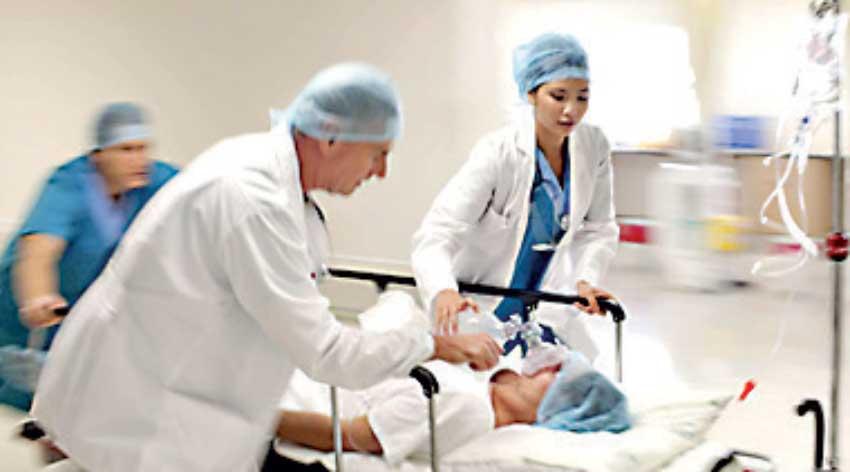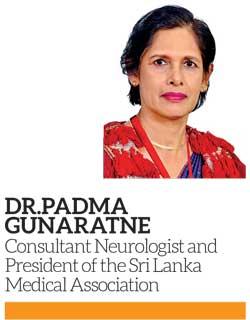29 Oct 2021 - {{hitsCtrl.values.hits}}

 When a patient suffers from a stroke, every passing minute counts. As brain tissue and millions of neurons begin to fade away, time could not be more precious. Therefore the patient’s survival in most instances depend on how quickly a bystander or caretaker recognizes the symptoms and ensures that the patient is being taken to the hospital. In Sri Lanka, medical experts believe that the incidence of strokes are on the rise mainly because the aging population is on the rise.
When a patient suffers from a stroke, every passing minute counts. As brain tissue and millions of neurons begin to fade away, time could not be more precious. Therefore the patient’s survival in most instances depend on how quickly a bystander or caretaker recognizes the symptoms and ensures that the patient is being taken to the hospital. In Sri Lanka, medical experts believe that the incidence of strokes are on the rise mainly because the aging population is on the rise.
 “With COVID, there’s an increased tendency for people to get blood clots, especially with certain types of vaccines,” opined Dr. Padma Gunaratne, Consultant Neurologist and President of the Sri Lanka Medical Association. “There were incidents of blood clots reported after people got the Covishield vaccine for instance and this could lead to strokes and vascular diseases. On the other hand medical supplies were out of stock during the pandemic period and poor compliance, poor dietary adherence could have contributed to the rise in the number of stroke patients. Due to the covid situation their exercise wasn’t routine and they couldn’t adhere to a proper diet because they had to eat whatever that was available. Poor monitoring is another reason that could be attributed to the increase in incidence of cardiovascular diseases.” said Dr. Gunaratne.
“With COVID, there’s an increased tendency for people to get blood clots, especially with certain types of vaccines,” opined Dr. Padma Gunaratne, Consultant Neurologist and President of the Sri Lanka Medical Association. “There were incidents of blood clots reported after people got the Covishield vaccine for instance and this could lead to strokes and vascular diseases. On the other hand medical supplies were out of stock during the pandemic period and poor compliance, poor dietary adherence could have contributed to the rise in the number of stroke patients. Due to the covid situation their exercise wasn’t routine and they couldn’t adhere to a proper diet because they had to eat whatever that was available. Poor monitoring is another reason that could be attributed to the increase in incidence of cardiovascular diseases.” said Dr. Gunaratne.
“In terms of medication patients will receive COVID treatment,” Dr. Gunaratne continued. “People with comorbidities are more prone to contract COVID and this is the community at risk of developing strokes as well. Therefore we need to ensure that their blood pressure is lowered and conditions such as diabetes and cholesterol are managed in order to prescribe blood thinners. As such it requires the management of the whole patient rather than a one entity.”said Dr. Gunaratne.
Many stroke patients face difficulties in speech, their cognitive functioning gets impaired and they may face bowel problems as well. Therefore healthcare professionals need to be trained on conducting a ‘swallowing assessment first. “This assessment needs to be done by a trained person and therefore we are in the process of training nurses and speech therapists for this task. Identifying the need to spread awareness on this training, the National Stroke Association has done several video clips,” she added.
She further said that Sri Lanka is far behind other countries in the region when it comes to dealing with stroke. “There’s room for improvement and I will be joining a webinar with other stakeholders in the Asia Pacific region to look at ways of strengthening care for stroke patients. Once a patient suffers from a stroke the signs have to be recognized immediately and the patient should be brought to the hospital. Thereafter, the hospital should be geared to conduct investigations, give clot busters within three hours and ensure the wellbeing of the patient. As such, the community, people and healthcare professionals need to be trained. There needs to be training, commitment and coordination and how this could be established will be discussed at length,” she added.
21 Dec 2024 7 minute ago
21 Dec 2024 13 minute ago
21 Dec 2024 1 hours ago
20 Dec 2024 9 hours ago
20 Dec 2024 20 Dec 2024